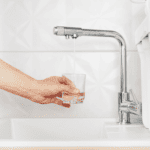In this article, we delve into an intriguing question – why does water make some people nauseous? This curious phenomenon, while not very common, does exist and can significantly impact an individual’s hydration and overall health.
Understanding Nausea
Nausea is a sensation of unease or discomfort in the upper stomach, typically preceding vomiting. A complex interplay of various factors can trigger it, including a myriad of physiological and psychological aspects.
- Physiological factors encompass things like gastrointestinal issues, pregnancy, and certain medications.
- Psychological factors could involve stress, anxiety, or fear.
Even though water is essential for life, some people report feeling nauseous after drinking it. The reasons could be varied and sometimes complex.
Possible Causes: Drinking Too Quickly
One plausible reason for water-induced nausea is drinking too quickly. Rapid fluid intake can overwhelm your stomach, leading to a feeling of fullness, bloating, and, in some cases, nausea.
- Your stomach needs time to process what you’ve consumed, and flooding it with large quantities of water doesn’t give it the chance to do so.
- This rush can cause your stomach to stretch rapidly, triggering discomfort and possibly leading to nausea.

Potential Factors: Water Quality
Another factor could be the quality of the water you’re drinking. If the water is contaminated or has a high mineral content, it might upset your stomach and induce nausea.
- Contaminants such as bacteria, viruses, or certain chemicals can cause gastrointestinal issues.
- High levels of minerals like iron, magnesium, or calcium can give water a distinct taste, which might not be pleasant and could result in nausea.
Underlying Health Conditions
Certain health conditions can make you more susceptible to feeling nauseous after drinking water. These might include gastroesophageal reflux disease (GERD), peptic ulcers, or gastroparesis.
- GERD involves the stomach acid frequently flowing back into the tube connecting your mouth and stomach, leading to a myriad of symptoms, including nausea.
- Peptic ulcers are sores that develop in the lining of the stomach, upper small intestine, or esophagus, and can cause discomfort and nausea.
- Gastroparesis is a condition that affects the stomach muscles and prevents the stomach from emptying properly, often leading to nausea and vomiting.
Psychological Factors
Interestingly, the feeling of nausea after drinking water can also be linked to psychological factors. For some individuals, this experience might be related to a condition known as aquaphobia, an irrational fear of water.
- While this phobia typically pertains to bodies of water, it can, in rare cases, extend to the act of drinking water as well.
- This psychological discomfort can manifest as physical symptoms, including nausea.
The Role of Drinking on an Empty Stomach
Drinking water, particularly in large quantities, on an empty stomach can sometimes lead to nausea. Your stomach expects to receive food, and when it receives only water, it can cause an upset, resulting in a queasy feeling.
- Drinking water before meals can, however, be beneficial for those looking to lose weight, as it provides a feeling of fullness.
- However, if you notice that drinking water on an empty stomach makes you nauseous, try to consume it along with or after meals instead.
Dealing with Hyponatremia
A condition called hyponatremia can cause nausea, which occurs when you drink so much water that your kidneys can’t excrete the excess, leading to a drop in sodium levels in your blood.
- This condition, also known as water intoxication, is rare but potentially life-threatening.
- Symptoms of hyponatremia include nausea, headache, confusion, seizures, and in severe cases, coma and death.

Medication Side Effects
Certain medications can cause nausea when taken with large quantities of water. These include certain antibiotics, chemotherapy drugs, and even over-the-counter pain relievers like aspirin or ibuprofen.
- If you’re taking any medication and experiencing water-induced nausea, consult with your healthcare provider.
- They may suggest taking the medication with a small amount of food, or adjusting the dosage or timing of the medication.
Taste Aversions and Sensitivities
Sometimes, the taste or temperature of water can trigger nausea, especially in those with heightened taste sensitivities or aversions. This is particularly prevalent among pregnant women who often experience changes in taste preferences and increased sensitivity to certain tastes and smells.
- If this is the case, altering the taste of water with a slice of lemon or cucumber, or drinking flavored water might help.
- Adjusting the temperature of the water to your liking could also be beneficial.
Possible Solutions and Remedies
If you frequently experience nausea after drinking water, several strategies might help. These include drinking small sips instead of large gulps, ensuring your water is clean and purified, or trying to drink at room temperature instead of cold.
- Techniques like deep breathing or distraction can also help manage the feeling of nausea.
- In some cases, ginger or peppermint tea might be more stomach-friendly alternatives as they are known for their anti-nausea properties.
Conclusion: Addressing Water-Induced Nausea
If you frequently experience nausea after drinking water, it’s crucial to identify the root cause. You might need to adjust your drinking habits, improve the quality of your water, or seek medical advice for possible underlying health conditions. Remember, adequate hydration is vital for your health, so don’t let nausea deter you from meeting your daily water intake. Consult with a healthcare provider to ensure you’re hydrating in a way that best suits your body’s needs.
Frequently Asked Questions
Q1: Why does drinking water make me nauseous?
Drinking water can make you nauseous for several reasons. You might be drinking too quickly, consuming poor quality or contaminated water, or experiencing symptoms of an underlying health condition. Psychological factors can also play a role.
Q2: Can drinking water too quickly cause nausea?
Yes, consuming large amounts of water in a short period can overwhelm your stomach, leading to feelings of fullness, bloating, and sometimes nausea.
Q3: How can the quality of water cause nausea?
If water is contaminated with bacteria, viruses, or certain chemicals, it can cause gastrointestinal issues leading to nausea. Additionally, water with a high mineral content can have an unpleasant taste that can trigger nausea.
Q4: What health conditions can cause water-induced nausea?
Health conditions like gastroesophageal reflux disease (GERD), peptic ulcers, gastroparesis, and hyponatremia can make you more susceptible to feeling nauseous after drinking water.
Q5: Can psychological factors cause nausea when drinking water?
Yes, certain psychological factors, like the irrational fear of water (aquaphobia), can cause physical symptoms like nausea. In rare cases, this extends to the act of drinking water as well.
Q6: What should I do if drinking water makes me nauseous?
Try adjusting your drinking habits, improve the quality of your water, or consult a healthcare provider for possible underlying health conditions. Also, consider drinking small sips instead of large gulps, ensuring your water is clean and purified, or trying to drink at room temperature instead of cold.
Q7: Can the taste or temperature of water trigger nausea?
Yes, some people with heightened taste sensitivities or aversions might find the taste or temperature of water nauseating. In such cases, altering the taste with a slice of lemon or cucumber, or adjusting the temperature might help.
Q8: Can certain medications cause nausea when taken with water?
Certain medications, including some antibiotics, chemotherapy drugs, and over-the-counter pain relievers, can cause nausea when taken with large quantities of water. If you’re taking any medication and experiencing water-induced nausea, it’s best to consult with your healthcare provider.









